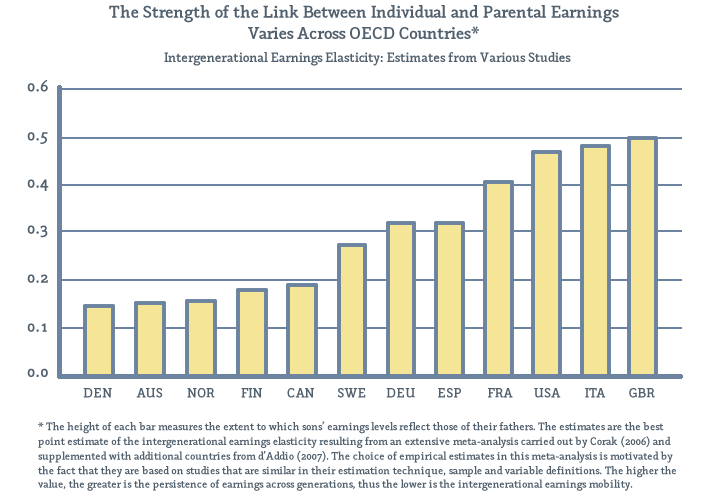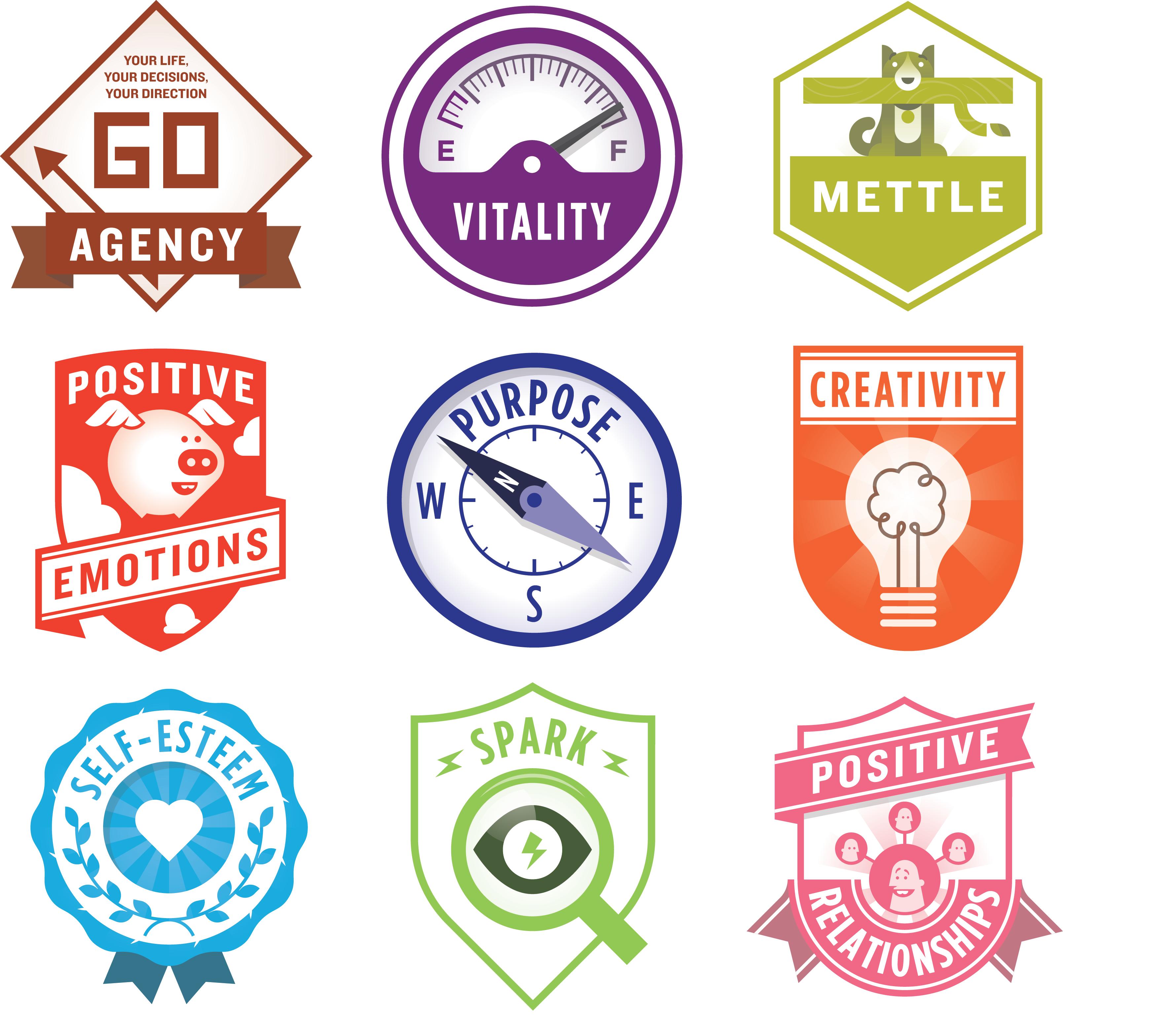Introduction
There are four key issues at play that affect the opportunities for marginalised young people in the UK seeking work. The primary problem is that there are few jobs available in the first place. Secondly, these jobs require skills for which many young people, and especially the most marginalised, are not being adequately prepared. Thirdly, young people’s habits and hobbies are changing, and now mostly revolve around online communication and digital consumption. Fourthly, the UK has one of the lowest levels of social mobility in the developed world. This is exacerbated rather than allayed through its stratified education system, meaning that there are few opportunities for inter-socioeconomic connections and engagement. These factors feed into a negative loop that prevents marginalised youth from flourishing and inhibits their ability to realise their full potential.
Spark+Mettle is a UK charity that breaks that cycle by ‘hacking’ into young people’s unfulfilling habits and converting them into productive practices. It builds the twenty-first century skills—character strengths, ‘soft’ attributes and networks—needed to succeed in both work and in life, and harnesses the power of technology to deliver its services.
The situation
The United Kingdom, like many countries in the world, is in the grip of a job crisis. Even though we are crawling out of the double-dip recession, nearly one in five of our 18–24-year-olds remain unemployed. Latest figures from the Office of National Statistics (ONS) show that youth unemployment is increasing at a much faster rate than the national unemployment rate (Hardie and Perry 2013, 6).
UK youth unemployment is also increasing at a much faster rate compared to other Organisation for Economic Co-operation and Development (OECD) countries. Although not as severe as in recession-riven countries such as Spain and Greece, the number of 15–24-year-olds unemployed in the UK has increased at a faster rate than that of the United States and OECD average, hovering around the 20% mark over the last four years.
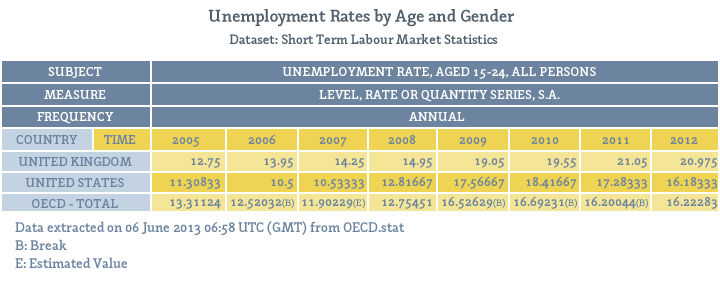
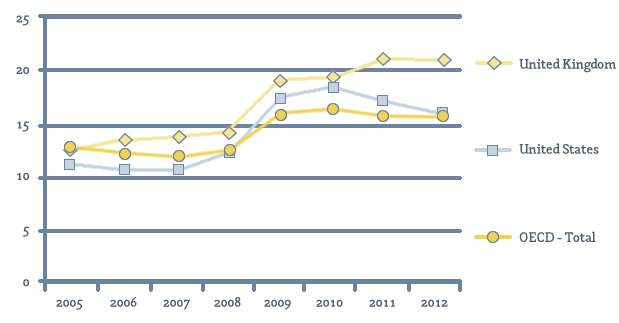
One key factor in the UK youth unemployment rate is the disconnect that exists between the skills young people are equipped with by the time they leave education, and the skills they will require for the (few) jobs available. The UK is moving toward an increasingly service-based economy. Over 40% of 16–24-year-olds currently employed work in service and sales sectors, and just 26% are employed in low-skilled jobs such as machine operatives (ONS Labour Force Survey, 2011).
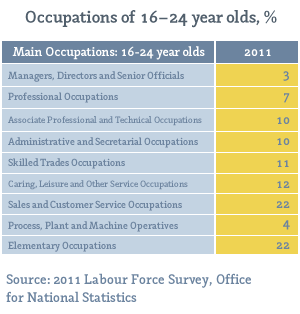
Thus there is an increasing need for ‘soft’ attributes—skills that are not normally tested in cognitive exams. In a 2011 report from Working Links, 71% of employers cited good “social skills” as being an important skillset they look for. A national survey of employers’ shortages in customer-handling skills (41%), problem-solving skills (38%) and team working skills (37%) were reported to be the key factors hindering recruitment (Shury et al. 2010, 24).On the basis of these findings, a report from the Work Foundation concludes that “for those young people with less- developed soft skills, accessing the labour market is likely to have become more difficult as a result of these changes” (Sissons and Jones 2012, 4). Lower levels of soft skills are often linked to lower socioeconomic status and education levels, which in turn reinforces the widening gap in employment rates between the poorest and the more financially comfortable.
The shift in skills needed to succeed in the job market is set to change even more. The Institute for the Future has identified ten “future work skills” needed for a 2020 workforce, influenced by key drivers such as the “new media ecology” and the “rise of smart machines and systems” (Davies, Fidler and Gorbis 2011). These skills include new media literacy, virtual collaboration and design thinking. Yet although several of these future skills centre around enhanced digital aptitudes and competencies, computing and technology curricula in schools still include basic skills training, such as word-processing.
Computing lessons are far removed both from what young people need to learn, and from what they are already doing on their computers, tablets and smartphones outside of the classroom. All young people in UK—whatever their employment or education status—are spending more and more time online. In fact, 18–24-year-olds spend more time online than any other age group. Across most generations, “just for fun” activities take up the vast majority of people’s online time; the UK average for time spent on social media and blogging sites as well as playing online games is 11 hours per month, compared to 2.1 hours per month for e-mail (Ofcom 2012).
In lower socioeconomic groups, there is nevertheless the problem of digital homophily: young people tend to use tech to interact only with their close group of peers, thus creating insular rather than porous networks (Hewes, Kahn and Abdo 2010, 7). Although the web and tech have the potential to be democratic, equality-enhancing tools, at the moment they are mostly being leveraged in this way by those who are already in fairly comfortable positions.
It has been concluded that “Britain is falling short in its aspiration of providing equal chances for everyone to thrive” (Equality and Human Rights Commission 2010). Evidence gathered by the University of Cambridge shows that only 11% of the UK’s population is flourishing, and that the poorest are half as likely to flourish as the wealthiest (Huppert and So 2009). This correlates with recent research from the new economic foundation (nef), showing that the UK ranks 13th out of 22 European countries surveyed (Michaelson et al. 2009), even though it consistently ranks 3rd in Europe in terms of GDP (International Monetary Fund 2012). nef’s latest research indicates that wealthier UK residents have higher levels of wellbeing than their European peers, but those in the UK with an equivalent income of €18,000 (roughly US$23,907) or less have lower levels of wellbeing. Once again, the country is not effectively supporting those with the least resources available to them. In fact, the UK has the lowest levels of social mobility of all developed countries in the OECD (OECD 2010, ch. 5).
Our approach
Spark+Mettle was founded in 2011 to find innovative solutions to youth unemployment, and bases its approach on addressing the four interwoven problems described above. The organisation focuses on enabling marginalised young people, including those from low socioeconomic backgrounds, to equip themselves with the twenty-first century skills that are needed to find and stay in work.
There is an underlying cultural assumption prevalent in the UK’s professional classes that “you can teach skills, but you can’t teach attitude.” This is not Spark+Mettle’s view. We believe that saying you cannot teach attitude is like saying you cannot teach a language. For most of us attitudinal learning begins through a process of osmosis while we are children—it gets picked up unwittingly, we adopt what those around us do, and that gets reinforced or undermined by whatever life might throw at us. Fortunate people grow up in great families and communities who are for the most part unaware that they are adept at teaching attitudinal skills (also known as social-emotional capabilities, character strengths or non-cognitive abilities).
Our view is that many marginalised young people particularly struggle to find work not just because of general systemic social, economic and cultural inequalities that exist in the UK, but also because these young people have not been given the same quality or quantity of opportunities to model, practise and improve these attitudinal skills and strengths.
Spark+Mettle teaches the unteachable. We have developed a framework and a process that is based on research from the University of Cambridge, University of Pennsylvania and other academic institutions. We believe that there are nine principle character strengths—including spark (zest, engagement or interest in what we do), mettle (resilience, grit, determination) and a strong sense of purpose or meaning. Throughout our lives, we need to identify and continually improve our strengths in order to fulfil our potential.
Spark+Mettle’s Nine Character Strengths
We see the development of these nine strengths as the foundation needed to build a flourishing and happy life. So only once we have come to grips with these strengths can we then proceed with developing work-focused soft skills such as collaboration, decision-making and an ability to handle stress. Unlike character strengths—which are general and can be applied across numerous situations—soft skills are specific learned aptitudes that can involve a number of character strengths. So in our framework, it is only possible to teach good decision-making effectively once the learner has understood and acquired a sense of agency and purpose as well as some mettle.
Spark+Mettle’s Seventeen Soft Skills
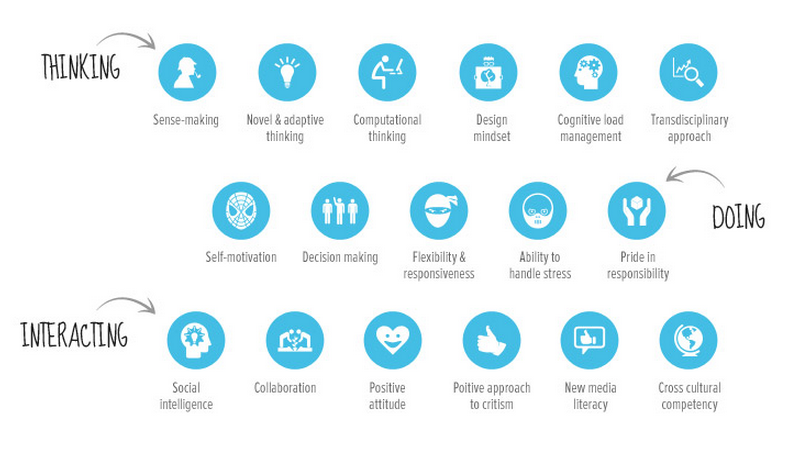
All of our work, whether online or in person, is structured around this framework. But we are not dogmatic about it; in fact we are excited to be part of the emerging dialogue around character strengths, social-emotional capabilities, attitudinal learning, non-cognitive abilities and soft skills. These traits may be known by different names to different people, but there is near-universal consensus that they are as crucial as academic development to human flourishing. How and when they develop within us influences who we are now, but we all have equal capacity to increase them so that we can become who we truly want to be.
Throughout our programmes we maintain three core tenets to our approach: everything we do is co-created by the young people we work with; everything we do creates opportunities for intergenerational and interclass collaboration that is fun, flexible and productive; and everything we do harnesses technology and digital for positive effect.
In two years we’ve grown to support over 600 young people to identify, develop and showcase key character strengths and soft skills with overwhelmingly positive results. Young people have co-designed and co-delivered with us a range of services—from an online personal and professional coaching programme, to product design workshops, intergenerational seminars and a huge new game-styled, or “gamified” online learning journey that we launched earlier this year. An SROI report within our first six months indicated that for every £1 spent, we generated £1.90 in social return (Smith et al. 2012).
Our future
There is strong evidence about the connection between social and emotional capabilities and positive life outcomes, including educational attainment, health, employment status and behaviour. But a 2012 report from the Young Foundation notes that this is hard to assess:
Providers and commissioners often find it easier to quantify and monitor ‘harder’ outcomes – tangible ‘results’ such as educational achievement, participation in training, exclusion from school, offending or challenging behaviour – than so-called ‘softer’ social and emotional capabilities. Self-esteem, resilience and thinking skills, for instance, all underpin young people’s progress but can be hard to assess. It can be difficult to make the case for such ‘softer’ outcomes, despite many compelling examples of lives transformed, in which building these capabilities has been a prerequisite to success in ‘hard outcome’ terms. (McNeil, Reeder and Rich 2012, 7)
In January 2013 we successfully launched Discoverables in beta: a gamified online platform that enables young people to identify, develop and showcase the twenty-first century skills that are relevant to them. We are now building out the app so that nonprofits, schools and other agencies in the youth sector are able to quantify and codify the nebulous ‘soft’ outcomes they are having on young people, against their own sets of measures and values. This is done not through a complex psychometric process, but rather through an engaging and dynamic web app that enables young individuals to upload evidence (as text, image or video) around the strengths and skills they are acquiring. The process is gamified, with badges and a points system built in. It culminates in a visually-arresting showcase page for individual users that professionalises their online identities, as well as provides a rich, quantifiable data set for administrators. We are also building in opportunities for intergenerational communication and support, including micro-mentoring around specific career sectors, strengths and skills.
Conclusion
Technology, digital and online platforms alone cannot solve the youth unemployment crisis (and in fact, thanks to increasing automisation are in some ways worsening the problem). But by co-creating services with young people that harness technology in innovative and imaginative ways we can incentivise them and their peers to convert some of their “just for fun” online time into productive and meaningful activity, we can inspire them to set down paths of self-led learning and we can forge opportunities for them to collaborate and communicate with professionals far beyond their own networks.
Spark+Mettle’s vision is to become the global heavy hitter for the soft stuff. We will support millions of individuals and thousands of organisations to build character strengths and soft attributes and networks—the all-important twenty-first century skills. These might seem nebulous but are in fact fundamental to finding work, succeeding in a career and leading a satisfying, flourishing life.
Eugenie Teasley is founder and CEO of Spark+Mettle. She has a BA in Classics from Oxford University and an MA in Social and Cultural Studies in Education from UC Berkeley. She taught 11–18-year-olds at a school in south London before working at education nonprofit 826 Valencia in San Francisco. Since returning to the UK in 2009 she has written and consulted on educational issues and programmes for national and international organisations. She founded Spark+Mettle in 2011.
References
Davies, Anna, Devin Fidler and Marina Gorbis. 2011. Future Work Skills 2020. Phoenix: Institute for the Future for the University of Phoenix Research Institute.
Equality and Human Rights Commission. 2010. How Fair Is Britain? London: Equality and Human Rights Commission.
Hardie, Michael and Frederick Perry. 2013. Economic Review, June 2013. London: Office for National Statistics.
Hewes, Sarah, Lauren Kahn and Mary Abdo. 2010. Plugged In, Untapped. London: Young Foundation.
Huppert, Felicia A., and Timothy T. C. So. 2009. What percentage of people in Europe are flourishing and what characterises them? Paper presented the OECD/ISQOLS meeting “Measuring subjective well-being: an opportunity for NSOs?” Florence, Italy, July 23–24.
International Monetary Fund. 2012. “World Economic Outlook Database, April 2012”. Accessed 6 June 2013. http://www.imf.org/external/pubs/ft/weo/2012/01/weodata/index.aspx
McNeil, Bethia, Neil Reeder and Julia Rich. 2012. A framework of outcomes for young people. London: The Young Foundation.
Michaelson, Juliet, Saamah Abdallah, Nicola Steuer, Sam Thompson and Nic Marks. 2009. National Accounts of Well-being.
OECD 2010. Going for Growth 2010. Accessed 6 June 2013.
http://www.oecd.org/social/labour/economicpolicyreformsgoingforgrowth2 010.htm
Ofcom. 2012. “Communications Market Report 2012”. Accessed 6 June 2013.
http://stakeholders.ofcom.org.uk/binaries/research/cmr/cmr12/CMR_UK_2012.pdf
Shury, Jan, Mark Winterbotham, Ben Davies, Katie Oldfield, Mark Spilsbury and Dr. Susannah Constable. 2010. National Employer Skills Survey for England 2009: Key findings report. London: UK Commission for Employment and Skills.
Sissons, Paul and Katy Jones. 2012. Lost in transition? The changing labour market and young people not in employment, education or training. London: The Work Foundation.
Smith, Hannah, Perihan Abou Zied, Anastasia Dokutovich and Derron Curtis. 2012. “Star Track: the first 6 months.” MA thesis, University of London, Goldsmiths.
Working Links. 2011. Learning a living: a research report into Apprenticeships and reducing youth unemployment. London: Working Links.



